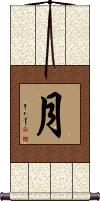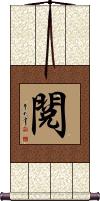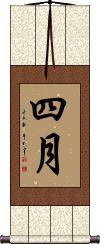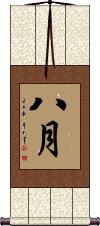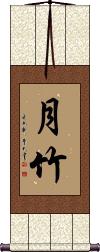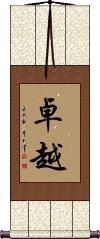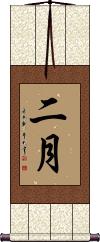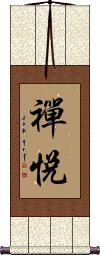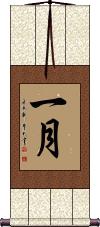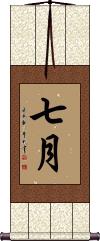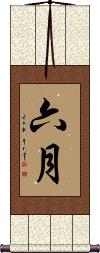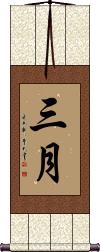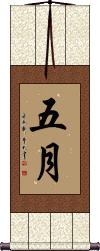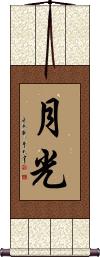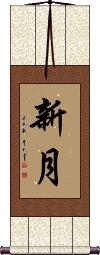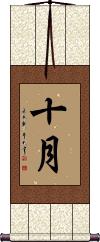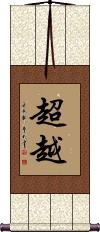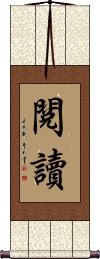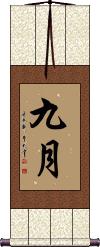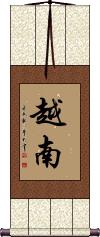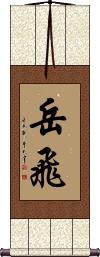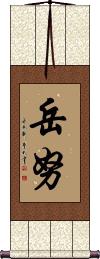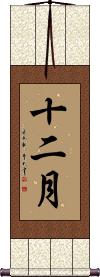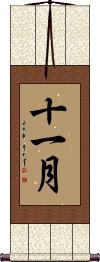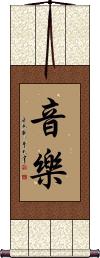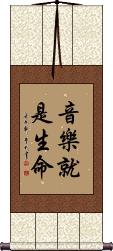Many custom options...
And formats...

Yue4 in Chinese / Japanese...
Buy a Yue4 calligraphy wall scroll here!
Personalize your custom “Yue4” project by clicking the button next to your favorite “Yue4” title below...
1. Moon
2. Read
3. April
4. August
5. Bamboo Moon
6. Excellence
7. February
8. Inner Bliss and Peace from Meditation
9. January
10. July
11. June
12. Month of March
13. The Month of May
14. Moonlight
15. New Moon
16. October
17. Overcome / Surpass / Rise Above
18. Read / Reading
19. September
20. Vietnam
21. Yue Fei
22. Yuenu
23. December
24. November
25. Sun Moon Stars
26. Music
27. Flower in the Mirror, Moon on Water
30. Musician
31. Music is Life
Moon
月 is how to write the title for “moon” in Chinese, Korean Hanja, and Japanese Kanji.
月 is also used to refer to the month. This is because China traditionally uses a lunar calendar, so saying “next moon” is the same as saying “next month” etc.
In modern Chinese and Japanese and old Korean, the character for a number is put in front of this moon character to represent western months. So “one moon” is January “two moons” is February etc.
If you are wondering, in the east Asian way to write dates, the character for “sun” or “day” is used with a number in front of it to express the day of the month. So “ten moons, one sun” becomes “October 1st” or “10/1” (this date happens to be Chinese National Day - The equivalent of Independence Day in the USA, Canada Day, or the Queen's Birthday).
In Japanese, 月 can be a surname that romanizes as Tsuki, Tsukizaki, or Takagetsu.
Read
閱 is a Chinese character that means to read. It can also refer to observing (the world, and learning from it), or gaining life experiences. 閱 is a good character to relay the idea of being “well-read,” which can include reading books, studying, and learning through experience.
The dictionary definition also includes: to inspect; to review; to peruse; to go through; to experience.
Technically, this is also a Japanese Kanji but only some Japanese Buddhists use it (most of the population will not recognize it).
In Chinese and Japanese Buddhism, this means examining, inspecting, and/or looking over.
April
Fourth Month
This is April in Chinese, Japanese Kanji, and old Korean Hanja.
This was originally the fourth month of the Chinese lunar year, now used for the fourth month of the Gregorian calendar (also known as the Western or Christian calendar). 四月 literally mean “fourth month” or “fourth moon.”
August
Eighth Month
八月 is the month of August in Chinese, Japanese Kanji, and old Korean Hanja.
八月 literally means “eighth month” or “eighth moon.”
In Japanese, this can also be the female given name, Yatsuki, in much the same way August can be a female given name in English.
Bamboo Moon
月竹 is the title, “Bamboo Moon” - Technically, it's in the order of “moon bamboo,” but that's the most natural order in Chinese and Japanese.
With a little research, I found this title has been used as the name of a linen company, a band, a song title, an actual person's name, the title for a piece of artwork featuring bamboo with a moon in the background, and a few other things. I added it here because many people searched for “bamboo moon” on my website, so here it is for you.
The typical Japanese pronunciation would probably be "tsu-ki ta-ke." However, this would not be the only possible pronunciation in Japanese (especially if used as a given name).
Excellence
February
二月 is the Chinese, Japanese Kanji, and old Korean Hanja for the month of February.
This literally means the “second month” or “second moon” (of the year).
Inner Bliss and Peace from Meditation
禪悅 is a title that refers to the inner bliss and peace you can achieve from meditation.
This term transcends a few religions, including Taoism and Buddhism. It can also be translated as “joy of the mystic trance” or simply “meditative bliss.”
Amazing that such a complex idea can be expressed in just two Chinese characters. Note that the first character is Chan/Zen (Chinese/Japanese), which means “meditation” in both languages.
January
First Month
一月 is the month of January, the first month of the year, in Chinese, Japanese Kanji, and old Korean Hanja.
July
Seventh Month
七月 is how Chinese and Japanese express July (also used in old Korean Hanja).
七月 literally means “seventh month” or “seventh moon.”
June
Sixth Month
This is the month of June in Chinese, Japanese Kanji, and old Korean Hanja.
This was originally the sixth month of the Chinese lunar year, now used for the sixth month of the Gregorian calendar (also known as the Western or Christian calendar). 六月 literally mean “sixth month” or “sixth moon.”
Month of March
Third Month of the Year
三月 is the Chinese, Japanese, and Chinese way to write the month of March.
This literally reads as “third month” or “third moon.”
The Month of May
Fifth Month
五月 is the month of May in Chinese, Japanese Kanji, and old Korean Hanja.
This was originally the fifth month of the Chinese lunar year, now used for the fifth month of the Gregorian calendar (also known as the Western or Christian calendar). 五月 literally means “fifth month” or “fifth moon.”
Note: Sometimes Japanese parents will use this as a female given name, and use "Mei" (the sound of May in English) as the pronunciation.
Moonlight
月光 is the Chinese, old Korean Hanja, and Japanese Kanji title for moonlight.
This can also be used to describe a moonbeam and can be a given name in all three languages (pronounced as Rumi when used as a female given name in Japanese).
New Moon
October
Tenth Month
十月 is how Chinese and Japanese express October (also used in old Korean Hanja).
十月 literally means “tenth month” or “tenth moon.”
Overcome / Surpass / Rise Above
In Chinese, Japanese Kanji, and old Korean Hanja, 超越 means to overcome, surpass, transcendence, excel, exceed, go beyond, rise above, or transcend.
Read / Reading
September
Ninth Month
九月 is the Chinese, Japanese Kanji, and old Korean Hanja for the month of September.
Originally this was for the ninth month of the lunar calendar, now used for the western (Gregorian) calendar.
This can also be the Japanese female given name Kugetsu.
Vietnam
Yue Fei
Yuenu
December
Twelfth Month
十二月 is December, the twelfth month of the year, in Chinese, Japanese Kanji, and old Korean Hanja.
November
Eleventh Month
十一月 is the Chinese, Japanese, and old Korean title for the month of November.
This literally means the eleventh month or moon.
Sun Moon Stars
Music
音樂 is how to write music in most Asian languages.
It can also express the idea of a musical movement, depending on context.
![]() The second character has morphed a bit in Japanese Kanji. If you want the specifically modern Japanese version, please click on the Kanji to the right, instead of the button above. The version shown to the left was used in ancient Japan, prior to the Japanese language reformations after WWII (so technically,
it’s
still Japanese).
The second character has morphed a bit in Japanese Kanji. If you want the specifically modern Japanese version, please click on the Kanji to the right, instead of the button above. The version shown to the left was used in ancient Japan, prior to the Japanese language reformations after WWII (so technically,
it’s
still Japanese).
Flower in the Mirror, Moon on Water
鏡花水月 is an old Asian proverb that means “flowers in a mirror and the moon reflected in the lake” or “flowers reflected on a mirror and the moon reflected on the water's surface.”
Literally, 鏡花水月 reads “Mirror Flower, Water Moon.”
Figuratively this can be used to represent a lot of different ideas. It can be used to express an unrealistic rosy view or viewing things through rose-tinted spectacles. So you can use it to relay an idea about something that is visible but has no substance,
something that can be seen but not touched, or something beautiful but unattainable such as dreams or a mirage.
This expression is used to describe things like the subtle and profound beauty of poems that cannot be described in words.
鏡 = Mirror (or lens)
花 = Flower(s)
水 = Water
月 = Moon
Can also be written 水月鏡花 (just a slight change in word/character order).
To Infinity and Beyond
The Sun, Moon, and Stars
日月星辰 is a title that encompasses all of the heavenly bodies or celestial bodies.
Namely, this includes the Sun, Moon, and Stars of our universe.
Musician
音樂家 is how to write “musician” in most Asian languages.
There is more than one way to express “musician” in China, but this is the traditional and most respectful title.
![]() The second character has morphed a bit in Japanese Kanji. If you want the specifically modern Japanese version, please click on the Kanji to the right, instead of the button above. The version shown to the left was used in ancient Japan, prior to the Japanese language reformations after WWII (so technically,
it’s
still Japanese).
The second character has morphed a bit in Japanese Kanji. If you want the specifically modern Japanese version, please click on the Kanji to the right, instead of the button above. The version shown to the left was used in ancient Japan, prior to the Japanese language reformations after WWII (so technically,
it’s
still Japanese).
Music is Life
Mountain Travels Poem by Dumu
This poem was written almost 1200 years ago during the Tang dynasty.
It depicts traveling up a place known as Cold Mountain, where some hearty people have built their homes. The traveler is overwhelmed by the beauty of the turning leaves of the maple forest that surrounds him just as night overtakes the day, and darkness prevails. His heart implores him to stop, and take in all of the beauty around him.
First, before you get to the full translation, I must tell you that Chinese poetry is a lot different than what we have in the west. Chinese words simply don't rhyme in the same way that English or other western languages do. Chinese poetry depends on rhythm and a certain beat of repeated numbers of characters.
I have done my best to translate this poem keeping a certain feel of the original poet. But some of the original beauty of the poem in its original Chinese will be lost in translation.
Far away on Cold Mountain, a stone path leads upwards.
Among white clouds, people's homes reside.
Stopping my carriage I must, as to admire the maple forest at nights fall.
In awe of autumn leaves showing more red than even flowers of early spring.
Hopefully, this poem will remind you to stop, and “take it all in” as you travel through life.
The poet's name is “Du Mu” in Chinese that is: ![]()
![]() .
.
The title of the poem, “Mountain Travels” is: ![]()
![]()
You can have the title, poet's name, and even “Tang Dynasty” written as an inscription on your custom wall scroll if you like.
More about the poet:
Dumu lived from 803-852 AD and was a leading Chinese poet during the later part of the Tang dynasty.
He was born in Chang'an, a city in central China and the former capital of the ancient Chinese empire in 221-206 BC. In present-day China, his birthplace is currently known as Xi'an, the home of the Terracotta Soldiers.
He was awarded his Jinshi degree (an exam administered by the emperor's court which leads to becoming an official of the court) at the age of 25 and went on to hold many official positions over the years. However, he never achieved a high rank, apparently because of some disputes between various factions, and his family's criticism of the government. His last post in the court was his appointment to the office of Secretariat Drafter.
During his life, he wrote scores of narrative poems, as well as a commentary on the Art of War and many letters of advice to high officials.
His poems were often very realistic and often depicted everyday life. He wrote poems about everything, from drinking beer in a tavern to weepy poems about lost love.
The thing that strikes you most is the fact even after 1200 years, not much has changed about the beauty of nature, toils, and troubles of love and beer drinking.
Not the results for yue4 that you were looking for?
Below are some entries from our dictionary that may match your yue4 search...
| Characters If shown, 2nd row is Simp. Chinese |
Pronunciation Romanization |
Simple Dictionary Definition |
月 see styles |
yuè yue4 yüeh tsuki つき |
More info & calligraphy: Moon(1) Moon; (2) month; (3) moonlight; (4) (See 衛星・1) (a) moon; natural satellite; (female given name) Runa candra, 旅達 (旅達羅); 旂陀羅; 戰達羅; 戰捺羅 the moon, called also 蘇摩 soma, from the fermented juice of asclepias acida used in worship, and later personified in association with the moon. It has many other epithets, e. g. 印度 Indu, incorrectly intp. as marked like a hare; 創夜神 Niśākara, maker of the night; 星宿王 Nakṣatranātha, lord of constellations; 喜懷之頭飾 the crest of Siva; 蓮華王 Kumuda-pati, lotus lord; 白馬主 Śvetavājin, drawn by (or lord of) white horses; 大白光神 Śītāṃśu, the spirit with white rays; 冷光神 Sitamarici, the spirit with cool rays; 鹿形神 Mṛgāṅka, the spirit with marks m form like a deer; 野兎形神 Śaśi, ditto like a hare. |
閱 阅 see styles |
yuè yue4 yüeh echi |
More info & calligraphy: ReadExamine, inspect, look over. |
一月 see styles |
yī yuè yi1 yue4 i yüeh mutsuki むつき |
More info & calligraphy: Januaryone month; (adverbial noun) January; (female given name) Mutsuki |
七月 see styles |
qī yuè qi1 yue4 ch`i yüeh chi yüeh natsuki なつき |
More info & calligraphy: July(adverbial noun) July; (female given name) Natsuki |
三月 see styles |
sān yuè san1 yue4 san yüeh yayoi やよい |
More info & calligraphy: Month of Marchthree months; (female given name) Yayoi |
九月 see styles |
jiǔ yuè jiu3 yue4 chiu yüeh kugetsu くげつ |
More info & calligraphy: September(adverbial noun) September; (female given name) Kugetsu |
二月 see styles |
èr yuè er4 yue4 erh yüeh futatsuki ふたつき |
More info & calligraphy: Februarytwo months second moon |
五月 see styles |
wǔ yuè wu3 yue4 wu yüeh mei / me めい |
More info & calligraphy: The Month of May(1) (obsolete) fifth month of the lunar calendar; (2) (kana only) satsuki azalea (Rhododendron indicum); (adverbial noun) May; (female given name) Mei |
八月 see styles |
bā yuè ba1 yue4 pa yüeh yatsuki やつき |
More info & calligraphy: August(adverbial noun) August; (female given name) Yatsuki eighth month |
六月 see styles |
liù yuè liu4 yue4 liu yüeh rokugatsu ろくがつ |
More info & calligraphy: June(adverbial noun) June; (place-name) Rokugatsu |
十月 see styles |
shí yuè shi2 yue4 shih yüeh totsuki とつき |
More info & calligraphy: October(adverbial noun) October; (female given name) Totsuki |
卓越 see styles |
zhuó yuè zhuo2 yue4 cho yüeh takuetsu たくえつ |
More info & calligraphy: Excellence(n,vs,vi) preeminence; excellence; superiority; transcendence |
四月 see styles |
sì yuè si4 yue4 ssu yüeh watanuki わたぬき |
More info & calligraphy: Aprilfour months; (personal name) Watanuki Āṣāḍha, the fourth month. |
岳飛 岳飞 see styles |
yuè fēi yue4 fei1 yüeh fei gakuhi がくひ |
More info & calligraphy: Yue Fei(personal name) Gakuhi |
愛樂 爱乐 see styles |
ài yuè ai4 yue4 ai yüeh aira あいら |
More info & calligraphy: Aile(female given name) Aira The joy of right love, i.e. the love of the good. |
新月 see styles |
xīn yuè xin1 yue4 hsin yüeh wakatsuki わかつき |
More info & calligraphy: New Moon(1) new moon; first day of the lunar month; (2) (See 三日月) crescent moon; (female given name) Wakatsuki |
月光 see styles |
yuè guāng yue4 guang1 yüeh kuang gekkou / gekko げっこう |
More info & calligraphy: Moonlightmoonlight; moonbeam; (female given name) Rumi Candraprabha, 戰達羅鉢刺婆 Moonlight. One of the three honoured ones in the Vajradhātu, and in the Mañjuśrī court of the Garbhadhātu, known also as 淸涼金剛. |
禪悅 禅悦 see styles |
chán yuè chan2 yue4 ch`an yüeh chan yüeh zenetsu |
More info & calligraphy: Inner Bliss and Peace from Meditation |
超越 see styles |
chāo yuè chao1 yue4 ch`ao yüeh chao yüeh chouetsu / choetsu ちょうえつ |
More info & calligraphy: Overcome / Surpass / Rise Above(n,vs,vi) transcendence; transcendency Surpassing, supreme; to pass over, be exempt from. |
越南 see styles |
yuè nán yue4 nan2 yüeh nan etsunan; betonamu(gikun) えつなん; ベトナム(gikun) |
More info & calligraphy: Vietnam(See ベトナム) Vietnam; (place-name) Vietnam Vietnam |
閱讀 阅读 see styles |
yuè dú yue4 du2 yüeh tu |
More info & calligraphy: Read / Reading |
音樂 音乐 see styles |
yīn yuè yin1 yue4 yin yüeh onraku |
More info & calligraphy: MusicMusic, a musical accompaniment to a service. |
十一月 see styles |
shí yī yuè shi2 yi1 yue4 shih i yüeh juuichigatsu / juichigatsu じゅういちがつ |
More info & calligraphy: November(adverbial noun) November |
十二月 see styles |
shí èr yuè shi2 er4 yue4 shih erh yüeh kanna かんな |
More info & calligraphy: December(adverbial noun) December; (female given name) Kanna |
音樂家 音乐家 see styles |
yīn yuè jiā yin1 yue4 jia1 yin yüeh chia |
More info & calligraphy: Musician |
刖 see styles |
yuè yue4 yüeh getsu げつ |
to amputate one or both feet (punishment in imperial China) (one of the five mutilating punishments 五刑[wu3 xing2]) (hist) (See 剕) cutting off a foot (one of the five punishments of ancient China) |
岳 see styles |
yuè yue4 yüeh dake だけ |
wife's parents and paternal uncles (n,suf) (1) peak; (2) mountain; (p,m) Dake |
嶽 岳 see styles |
yuè yue4 yüeh dake だけ |
high mountain; highest peak of a mountain ridge (n,suf) (1) peak; (2) mountain; (place-name, surname) Dake crag |
悅 悦 see styles |
yuè yue4 yüeh etsu |
pleased To please, pleased. |
戉 see styles |
yuè yue4 yüeh |
variant of 鉞|钺[yue4] |
Click here for more yue4 results from our dictionary
The following table may be helpful for those studying Chinese or Japanese...
| Title | Characters | Romaji (Romanized Japanese) | Various forms of Romanized Chinese | |
| Moon | 月 | tsuki | yuè / yue4 / yue | yüeh |
| Read | 閱 阅 | yuè / yue4 / yue | yüeh | |
| April | 四月 | shi gatsu / shigatsu | sì yuè / si4 yue4 / si yue / siyue | ssu yüeh / ssuyüeh |
| August | 八月 | hachigatsu / yatsuki | bā yuè / ba1 yue4 / ba yue / bayue | pa yüeh / payüeh |
| Bamboo Moon | 月竹 | tsuki take / tsukitake | yuè zhú / yue4 zhu2 / yue zhu / yuezhu | yüeh chu / yüehchu |
| Excellence | 卓越 | taku etsu / takuetsu | zhuó yuè / zhuo2 yue4 / zhuo yue / zhuoyue | cho yüeh / choyüeh |
| February | 二月 | futatsuki / nigatsu | èr yuè / er4 yue4 / er yue / eryue | erh yüeh / erhyüeh |
| Inner Bliss and Peace from Meditation | 禪悅 禅悦 | chán yuè / chan2 yue4 / chan yue / chanyue | ch`an yüeh / chanyüeh / chan yüeh | |
| January | 一月 | ichi gatsu / ichigatsu | yī yuè / yi1 yue4 / yi yue / yiyue | i yüeh / iyüeh |
| July | 七月 | shichigatsu | qī yuè / qi1 yue4 / qi yue / qiyue | ch`i yüeh / chiyüeh / chi yüeh |
| June | 六月 | roku gatsu / rokugatsu | liù yuè / liu4 yue4 / liu yue / liuyue | liu yüeh / liuyüeh |
| Month of March | 三月 | mitsuki / sangatsu | sān yuè / san1 yue4 / san yue / sanyue | san yüeh / sanyüeh |
| The Month of May | 五月 | satsuki / go gatsu satsuki / gogatsu | wǔ yuè / wu3 yue4 / wu yue / wuyue | wu yüeh / wuyüeh |
| Moonlight | 月光 | gekkou / geko | yuè guāng yue4 guang1 yue guang yueguang | yüeh kuang yüehkuang |
| New Moon | 新月 | shingetsu | xīn yuè / xin1 yue4 / xin yue / xinyue | hsin yüeh / hsinyüeh |
| October | 十月 | juu gatsu / juugatsu / ju gatsu | shí yuè / shi2 yue4 / shi yue / shiyue | shih yüeh / shihyüeh |
| Overcome Surpass Rise Above | 超越 | chou etsu / chouetsu / cho etsu | chāo yuè / chao1 yue4 / chao yue / chaoyue | ch`ao yüeh / chaoyüeh / chao yüeh |
| Read Reading | 閱讀 阅读 | yuè dú / yue4 du2 / yue du / yuedu | yüeh tu / yüehtu | |
| September | 九月 | kugatsu | jiǔ yuè / jiu3 yue4 / jiu yue / jiuyue | chiu yüeh / chiuyüeh |
| Vietnam | 越南 | betonamu | yuè nán / yue4 nan2 / yue nan / yuenan | yüeh nan / yüehnan |
| Yue Fei | 岳飛 岳飞 | gakuhi | yuè fēi / yue4 fei1 / yue fei / yuefei | yüeh fei / yüehfei |
| Yuenu | 岳努 | yuè nǔ / yue4 nu3 / yue nu / yuenu | yüeh nu / yüehnu | |
| December | 十二月 | juu ni gatsu juunigatsu ju ni gatsu | shí èr yuè shi2 er4 yue4 shi er yue shieryue | shih erh yüeh shiherhyüeh |
| November | 十一月 | juu ichi gatsu juuichigatsu ju ichi gatsu | shí yī yuè shi2 yi1 yue4 shi yi yue shiyiyue | shih i yüeh shihiyüeh |
| Sun Moon Stars | 日月星 | nichigetsusei | rì yuè xīng ri4 yue4 xing1 ri yue xing riyuexing | jih yüeh hsing jihyüehhsing |
| Music | 音樂 音乐 / 音楽 | ongaku | yīn yuè / yin1 yue4 / yin yue / yinyue | yin yüeh / yinyüeh |
| Flower in the Mirror, Moon on Water | 鏡花水月 镜花水月 | kyou ka sui getsu kyoukasuigetsu kyo ka sui getsu | jìng huā shuǐ yuè jing4 hua1 shui3 yue4 jing hua shui yue jinghuashuiyue | ching hua shui yüeh chinghuashuiyüeh |
| To Infinity and Beyond | 超越無限 超越无限 | chāo yuè wú xiàn chao1 yue4 wu2 xian4 chao yue wu xian chaoyuewuxian | ch`ao yüeh wu hsien chaoyüehwuhsien chao yüeh wu hsien |
|
| The Sun, Moon, and Stars | 日月星辰 | nichigetsuseishin | rì yuè xīng chén ri4 yue4 xing1 chen2 ri yue xing chen riyuexingchen | jih yüeh hsing ch`en jihyüehhsingchen jih yüeh hsing chen |
| Musician | 音樂家 音乐家 / 音楽家 | ongakuka | yīn yuè jiā yin1 yue4 jia1 yin yue jia yinyuejia | yin yüeh chia yinyüehchia |
| Music is Life | 音樂就是生命 音乐就是生命 | yīn yuè jiù shì shēng mìng yin1 yue4 jiu4 shi4 sheng1 ming4 yin yue jiu shi sheng ming yinyuejiushishengming | yin yüeh chiu shih sheng ming | |
| Mountain Travels Poem by Dumu | 遠上寒山石徑斜白雲生處有人家停車坐愛楓林晚霜葉紅於二月花 远上寒山石径斜白云生处有人家停车坐爱枫林晚霜叶红于二月花 | yuǎn shàng hán shān shí jìng xiá bái yún shēng chù yǒu rén jiā tíng chē zuò ài fēng lín wǎn shuàng yè hóng yú èr yuè huā yuan3 shang4 han2 shan1 shi2 jing4 xia2 bai2 yun2 sheng1 chu4 you3 ren2 jia1 ting2 che1 zuo4 ai4 feng1 lin2 wan3 shuang4 ye4 hong2 yu2 er4 yue4 hua1 yuan shang han shan shi jing xia bai yun sheng chu you ren jia ting che zuo ai feng lin wan shuang ye hong yu er yue hua | yüan shang han shan shih ching hsia pai yün sheng ch`u yu jen chia t`ing ch`e tso ai feng lin wan shuang yeh hung yü erh yüeh hua yüan shang han shan shih ching hsia pai yün sheng chu yu jen chia ting che tso ai feng lin wan shuang yeh hung yü erh yüeh hua |
|
| In some entries above you will see that characters have different versions above and below a line. In these cases, the characters above the line are Traditional Chinese, while the ones below are Simplified Chinese. | ||||
Successful Chinese Character and Japanese Kanji calligraphy searches within the last few hours...
